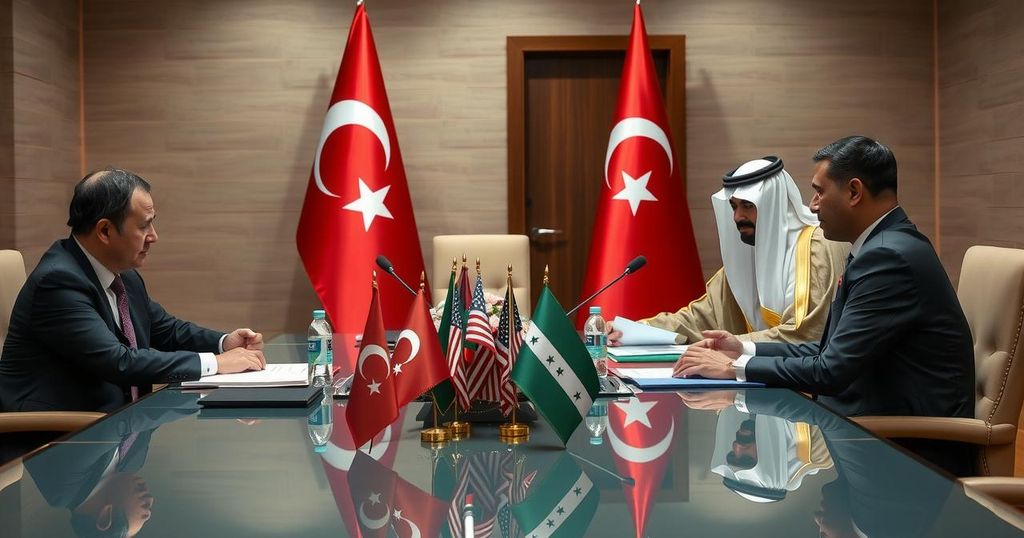Turkey Engages Saudi Arabia and UAE for Strategic Support in Syria

Turkey is seeking support from Saudi Arabia and the UAE to stabilize Syria after the Assad regime’s collapse. President Erdogan aims to engage with Gulf nations while emphasizing the need for a neutral Syrian government. Turkish officials, including Foreign Minister Hakan Fidan, are also coordinating with international actors and advocating for an inclusive governance process that respects all nations involved. However, Russia’s military presence and historical backing of Assad present significant obstacles to these initiatives.
Turkey is actively pursuing the support of Saudi Arabia and the United Arab Emirates (UAE) in shaping the future of Syria following the swift decline of President Bashar al-Assad’s regime. Turkish officials, wary of past missteps during the Arab Spring, recognize the importance of fostering collaboration with regional allies and Western nations to stabilize the war-torn country of approximately 20 million people. President Recep Tayyip Erdogan is particularly keen on engaging Gulf nations that have historically been cautious of Islamist movements, as their backing is deemed crucial for Syria’s longevity.
Erdogan is slated to attend a summit in Cairo to engage in discussions with Egyptian President Abdel Fattah el-Sisi regarding Syria’s governance, especially in light of shared concerns over the influence of Hay’at Tahrir al-Sham (HTS), a group once linked to al-Qaeda. While Turkey has consistently denied providing direct support to HTS, it acknowledges its influence within the organization and the need for a collaborative approach to stabilizing Syria.
Turkish Foreign Minister Hakan Fidan has already reached out to various international entities, including the Arab Contact Group, urging for an inclusive and equitable Syrian governance structure. He has emphasized that Turkey seeks a neutral and non-threatening Syria, urging all involved parties to respect each nation’s sovereignty and minimize sectarian tensions.
Turkey’s outreach to the UAE has sparked a notable shift in the formerly rigid stance of Gulf states towards Syria, with indications that they may be willing to invest in its recovery. Additionally, funding from Gulf nations, along with European Union support for reconstruction efforts, is vital for assisting Syria in rebuilding essential infrastructure and services.
However, the dominant presence of Russia, which has supported Assad’s regime militarily since 2015, complicates Turkey’s plans, particularly as certain EU states have called for Russian withdrawal before committing to Syria’s reconstruction. Ankara is optimistic that Russia can recognize the HTS-led government, aiding in the establishment of a stable and prosperous Syria backed by regional partners.
The ongoing conflict in Syria, which began over a decade ago, has created significant devastation and a humanitarian crisis, drawing in numerous regional and global actors with varying interests. As Assad’s regime faces internal and external challenges, Turkey emerges as a crucial player in the effort to influence Syria’s political landscape. The involvement of Saudi Arabia and the UAE, given their historical reservations towards Islamist factions and their potential economic resources, could significantly shape Syria’s reconstruction efforts post-conflict.
In conclusion, Turkey’s pursuit of regional support from Saudi Arabia and the UAE is integral to its strategy for stabilizing Syria amid ongoing challenges. The collaborative efforts with Gulf nations and Western powers are essential for establishing a functional, inclusive, and neutral Syrian government. As Turkey navigates the complexities involving Russia and HTS, its ambitions for a peaceful and cooperative regional order depend heavily on successful diplomatic engagements.
Original Source: www.middleeasteye.net








